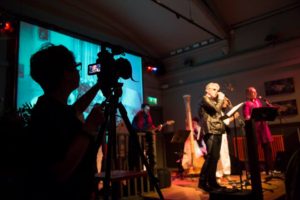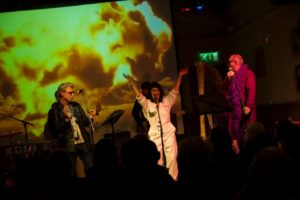
MSc Filmmaking and Media Arts students Caitlyn Foster and Chiara Passarini have been involved in the performance-lecture series Glasgow Glam Rock Dialogues, which was established by David Archibald (Film and TV) and Carl Lavery (Theatre) in 2016. The Dialogues, which involves a number of academics in the School of Culture and Creative Arts plus musicians and artists from further afield, recently performed two sold-out shows at The Tron Theatre.
Caitlyn tells us about her experiences working behind the scenes.
- So, Caitlyn – what is Glasgow Glam Rock Dialogues all about?
The Glasgow Glam Rock Dialogues is a performance project that critically reflects on political and social issues, especially in regards to capitalism and communism. At the

centre of the performance is a dialogue between two academics, Carl and David, and the different dialogue sessions frame these conversations through a Glam Rock filter. The most recent of the dialogues, 1967, was the fifth in the series and explored the legacy of the sixties’ revolutionary spirit by examining two possible futures – a fully automated Glam Rock communist luxury Heaven, and a nuclear annihilated and ecologically devastated capitalist Hell. The third dialogue, Commune, was the first I was involved with. It responded to Peter Watkins’s La Commune (Paris, 1871), a six-hour film, about the Paris Commune. In terms of style it very much celebrated a Brechtian theatrical practice and involved live film projections, which Chiara and I worked on, which were evocative of the film La Commune itself.
- How did you come to be involved?
During our semesters here as students of the Filmmaking and Media Arts MSc Programme we’re encouraged to sign up and record events our course convenor, Holger Mohaupt has collected. The Glasgow Glam Rock Dialogues were on last semester’s list. I was originally not signed up to film the event, but as two of the other students had scheduling conflicts with the dress rehearsal, I lucked out and took over the filming and editing for the production. Within moments of the first dress rehearsal I was really thrilled about the entire concept, so I’ve thrown myself in a bit deeper than was probably intended.
- What have you gained from your experience working on the project?
My background before studying and practicing film was in theatre, so it’s been really fantastic to think about my film practice in terms of theatre. For my former job I used to be required to record and edit stage performances at local universities, so it has been an excellent opportunity to try to elevate that skill, particularly in the editing of the performances. It was especially apparent with the last set of Dialogues, because so much of the edit tries to capture the feel of La Commune while still archiving the performance. It’s also been really incredible to be able to use my professor, Holger Mohaupt’s footage in the edit, so that in itself has become a master class of thinking about how he shot the performance live. How quickly he’s able to find and lock down his shots and make them cinematic and how long he holds on a shot with an edit in mind. I’ve basically been mentally going through his work and thinking about how to apply tactics he uses into my own filmmaking practice.
- Does your experience on Glasgow Glam Rock Dialogues inform your studies in any way?

The project itself has inspired my own personal study of thinking about the process of archiving theatre. I wrote a paper on it last semester thinking critically about the idea of archive and the potential responsibility that comes with it. What would be in a utopian theatre archive? When recording the show should the style of filming reflect the subject? How do you capture the stage which is a multidimensional and real space when the recording compresses it into a flat image that is controlled by who is recording? It’s a paper I wouldn’t mind expanding in the future with a bit more research and practice to reflect on. I’m also genuinely interested in the work Carl and David do to put into these performances and where the subjects come from and where they go next.
- What’s next for you?
I’m currently hard at work with research on my Master’s Dissertation and starting to think about if it’s a project that can be expanded forward into a PHD study. My current research is on Werner Herzog’s ‘Ecstatic Truth’ in documentary filmmaking. This research is going into my project ,which is currently a documentary with a science fiction aesthetic. The research though also comes back to the work on Glam Rock and the idea of theatre archiving and the role the film archivist plays in visually representing a production. I’m also hoping I’ll still be able to be involved in future productions of The Glasgow Glam Rock Dialogues. I think it’s absolutely essential that academics take routes like this to make their subjects and ideas more accessible to audiences and to encourage the idea that learning isn’t simply about sitting and listening – but a conversation that endlessly elevates how we think about and experience the world – with some Glam thrown in as well, absolutely crucial for any setting.
SCCA thanks Caitlyn for taking the time to talk to us.
For further updates, follow Glasgow Glam Rock Dialogues on Twitter: @glasglam

